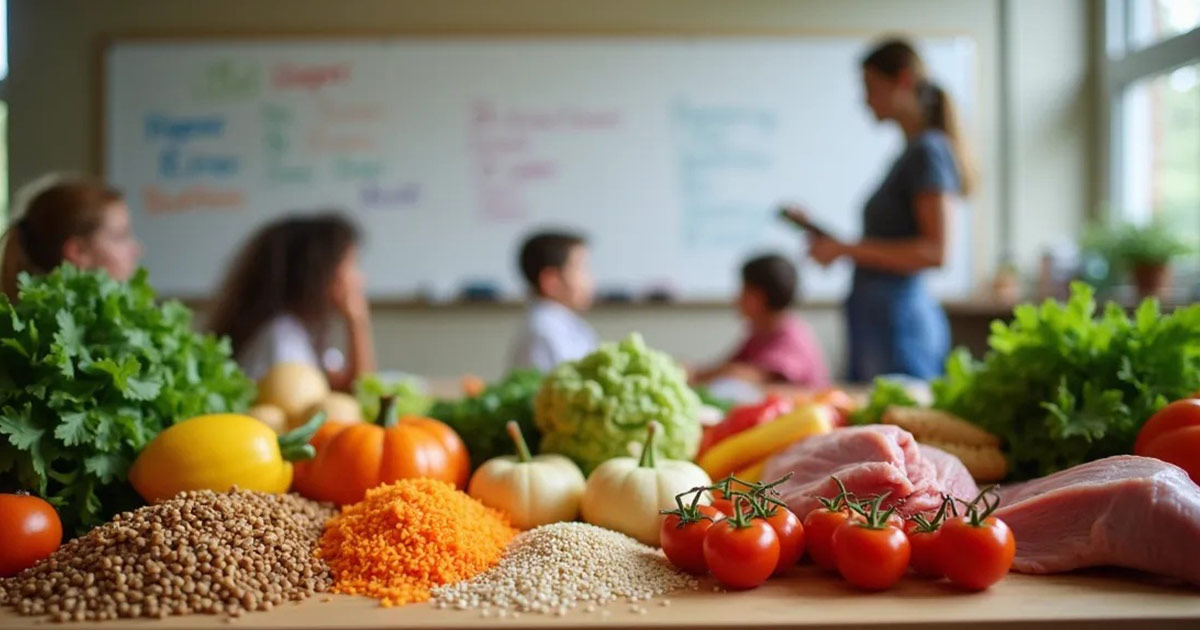
Bachelor of Science (Hons) in Food & Nutrition
By NCTA Team Last Updated: January 02, 2026Overview:
Food & Nutrition refer to the substances consumed to provide energy, nutrients, and overall health benefits. Food includes macronutrients like carbohydrates, proteins, and fats, along with micronutrients, fiber, and water. Nutrition focuses on how these components are processed by the body to support energy, growth, and repair while preventing diseases and promoting mental well-being. A balanced diet with essential nutrients is crucial for maintaining a healthy lifestyle and preventing chronic illnesses.
About the Course:
Bachelor of Science in Food & Nutrition is a comprehensive three-year undergraduate program designed to equip students with in-depth knowledge and practical skills in the fields of food science, nutrition, and dietetics. This program explores the relationship between food, nutrition, and health, focusing on how dietary choices influence wellbeing and disease prevention.
Students will study a wide range of topics, including food chemistry, human physiology, clinical nutrition, food safety, and community health. The curriculum integrates theoretical learning with hands-on training through laboratory work and field visits, preparing graduates for diverse career opportunities in healthcare, food industries, research, and public health.
This course is ideal for individuals passionate about promoting healthy lifestyles, addressing nutritional challenges, and contributing to advancements in food and nutrition sciences. Graduates can pursue roles as nutritionists, dieticians, food safety officers, or continue further studies in specialized areas of nutrition and public health.
Objectives:
To equip students with the knowledge and skills to analyze, apply, and promote principles of food science and nutrition for improving health and well-being.
Why Choose This Course?
Choosing the right course is a crucial decision for shaping your career and fulfilling your aspirations. Bachelor of Science in Food & Nutrition stands out as a versatile program that blends science, health, and innovation. Here are some compelling reasons why this course is an excellent choice:
- Diverse Career Opportunities: Graduates can pursue careers in healthcare, research, public health, food safety, and the food industry.
- Passion for Nutrition and Health: Ideal for individuals who are enthusiastic about understanding how food affects health and well-being.
- Addressing Nutritional Challenges: Provides skills to tackle global nutritional issues and promote healthier lifestyles.
- Foundation for Advanced Studies: Offers a strong academic base for further specialization in nutrition, dietetics, or public health.
- Contribution to Innovation: Enables students to contribute to advancements in food science and nutrition research.
What Does a Food & Nutritionist Do?
A Food & Nutritionist is a health professional who specializes in the science of food and its relationship to health. They assess nutritional needs, develop dietary plans, and provide guidance to individuals or groups to promote healthy eating habits and improve overall well-being. Nutritionists play a vital role in improving individual and public health by bridging the gap between food science and practical dietary applications. Key responsibilities of a Food & Nutritionist:
- Nutritional Assessment: Evaluate the dietary habits, medical history, and nutritional needs of clients or patients.
- Customized Meal Planning: Develop tailored meal plans based on health conditions, lifestyle, or goals such as weight management, athletic performance, or managing diseases like diabetes.
- Health Promotion and Education: Conduct workshops, seminars, or one-on-one sessions to educate about balanced diets, food safety, and healthy eating practices.
- Collaboration with Healthcare Teams: Work alongside doctors, nurses, and other health professionals to provide holistic care for patients.
- Research and Analysis: Study the impact of specific foods or diets on health, participate in food product development, or contribute to nutritional science research.
- Dietary Counseling: Provide support and guidance to individuals dealing with eating disorders, allergies, or chronic illnesses.
- Community and Public Health: Address large-scale nutritional issues, design programs to combat malnutrition, or work on public health initiatives to improve community well-being.
- Quality Control in Food Industry:Ensure food products meet safety and nutritional standards in roles such as food quality assurance or product development.
Course Curriculum:
The curriculum of this course ensures a strong foundation in food and nutrition science, while also equipping students with specialized knowledge and practical skills to excel in their chosen field. Key subjects include:
Year I:
- Introduction to Food Science
- Human Physiology
- Basic Biochemistry
- Fundamentals of Nutrition
- Communication Skills and Professional Ethics
- Practical: Food Chemistry and Analysis
Year II:
- Macronutrients: Carbohydrates, Proteins, and Fats
- Vitamins and Minerals: Functions and Sources
- Introduction to Dietetics
- Microbiology in Food & Health
- Environmental Studies
- Practical: Nutritional Assessment and Diet Planning
Year III:
- Food Processing and Preservation
- Nutritional Requirements Through the Life Cycle
- Nutritional Biochemistry
- Food Safety and Quality Control
- Research Methodology
- Practical: Food Preservation Techniques
Career Opportunities:
After completing the Bachelor of Science in Food & Nutrition, graduates have a wide range of career opportunities across various sectors. Some of the key career options include:
- Dietitian
- Nutritionist
- Clinical Nutritionist
- Food Safety Officer
- Public Health Nutritionist
- Food Technologist
- Sports Nutritionist
- Food Product Development Specialist
Salary Expectation:
Salary expectations for graduates with a Bachelor of Science in Food & Nutrition vary depending on the job role, experience, industry, and location. Nutritionists and dietitians typically earn between ₹3,00,000 and ₹10,00,000+ annually, with salaries increasing as they gain experience.
Course Features
| Course Code | UDC-525 |
| Duration | 3 Years |
| Category | Bachelor of Science (Hons) in Food & Nutrition |
| Eligibility | XII from recognized board |
| Fees | 3×25000= 75,000 |
To know more about our this course, feel free to call us at:
+91 9733600770Ready to Enroll in This Course?
Start your learning journey today and unlock your potential!
Apply Now for This Course
